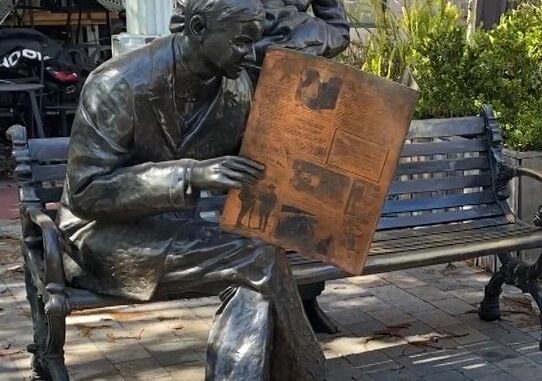
“When we are not honest about our past…we are allowing it to repeat…Even if we don’t talk about it, it still exists. ” Mayor Yasmine Imani McMorrin’s response to the city staff’s decision to redact names from the Historical Context Study was a gentle but clear condemnation of this inexplicable choice.
The Culver City Council meeting on March 18, 2024 saw the arrival of the long awaited Historical Context Study, but with a major issue; the report presented by the staff to the council was described as being redacted, so that the names of individuals involved were not visible.
The study was considered as a part of the council’s discussion of Culver City offering reparation for past racial harms. On August 8, 2022, the City Council received a presentation from Kamilah Moore, the Chair of the Department of Justice’s California Reparations Task Force and City staff presented information on how other cities designed their reparation programs to narrow the racial income and housing gap in their cities. On September 12, 2022, council authorized the preparation and issuance of a request for proposals to prepare a historical context study.
The study, done by Architectural Resources Group, was commissioned by the council in January of 2023.
Speaking to the council, Andrew Goodrich of ARG offered a presentation to introduce the work of the study as a means to “.. collect and understand racial and cultural discrimination in Culver City from the 19th Century to the present, so that the city has the data it needs to inform current and future policy choices…and [offer data on how] this has shaped the city’s landscape over time.”
Chronologically beginning ‘before WW II ‘ and ending in the present, the researchers used many sources to acquire the data. They included “newspaper archives and local history collections, census and other demographic data.” Newspapers included not just the Los Angeles Times, but also the Culver City based Evening Star News and and Venice based Evening Express. “We also looked at Black-owned papers like the California Eagle and the Los Angeles Sentinel, and these proved to be very important resources for us, as they reported on issues related to race and inequities.”
A survey offered online by the city received 179 responses from past and present residents about their experiences with racial prejudice in Culver City, and was included in the data.
Goodrich concluded that “This study was an important first step for the city. The intent of this document is to provide an authoritative account of discrimination in this city…to ensure that the historical record tells a full and accurate story.”
When Mayor McMorrin asked Goodrich about the lack of specifics in the most recent section of the report, noting that “It seems as if there are a lot more names in the more historical section, and things get kind of vague as we move towards the present … was that a conscious choice?” Goodrich offered to turn things over to city staff.
Michelle Hamilton, the Senior Human Resources and Equity Manger for the city said “When we received the report, there were names listed throughout [but we know] a lot of this information is already available through public record… We thought, in terms of moving the city forward, that it would be best to suppress the names to foster more impactful change in the future… The staff is looking forward to the development of the Racial Equity Action Plan… and rather than focus on names, we need to look at the issues, going forward.”
McMorrin replied “So, just to be clear, we have a version of the report that is historical, but the version that we have been given is redacted.” Hamilton agreed.
After taking comments from the rest of the council, each of whom had something to add of their own, McMorrin brought focus back into why the document had been created, and the essential need for honesty and transparency to rectify the past.
McMorrin stated “I think it is incredibly important to have an historical document …this conversation is really important. Systemic discrimination [is only a part of how the city functioned] … highlighting the racial terror that was a part of maintaining “sundown towns, we need to know that the complicity and acceptance of the violence was something that happened, not just here, but across the country. We need to truly understand why some people might be struggling with that, moving forward.
“You don’t have to be a member of a marginalized group to be committed to equity. The fact that this report exists is significant, but the decision to redact is just really difficult to hear. I don’t know how we stand behind a historical context study when the full study is not here – by choice.”
Judith Martin-Straw


1 Trackback / Pingback
Comments are closed.